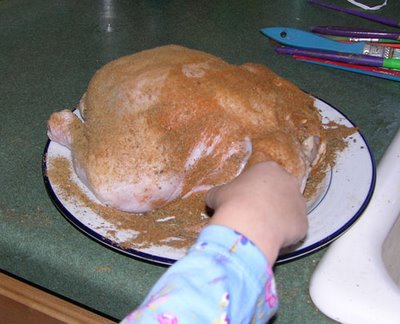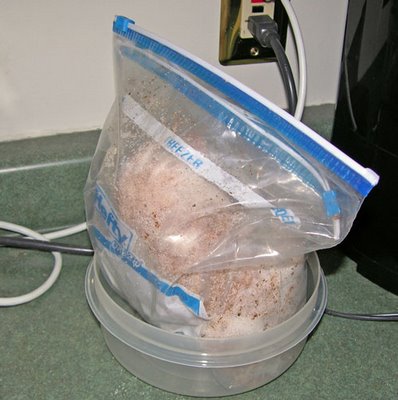Sunday, February 25, 2007
Google docs, have you tried them?
There are some privacy concerns-- since any data in a google document is stored on someone else's computer, and passed over the internet, I won't be making a spreadsheet of social security numbers or bank accounts. But it's fine for most of the reasons I make spreadsheets.
Google also offers a word processing program--- it would be ideal for collaborative writing, and it could easily put together a presentable resume or term paper. It has fewer options for making a more creative document, but, realistically, how many of us need to do that? I am writing this post using it, but getting the "publish" option work correctly was tricky-- I have two blogger blogs, and until I got the title exactly right (including matching the case of the letters) it insisted on posting it to my personal blog (the one I set up first). All in all, it does seem to be a better editor than blogger's default editor.
Given that Microsoft Office Home and Student 2007 is selling for $129 on Amazon, a free alternative is very attractive, especially for those of us who don't need all the bells and whistles.
Sunday, February 11, 2007
"Finance lessons for Home Schoolers" or maybe not...
Our new Kiplinger's magazine surprised me by having an article geared toward homeschooling families. The title is "Finance lessons for Home Schoolers". It starts well:
| Once considered a fringe group, parents who home-school their children aren't such rarities anymore. Families looking for an alternative to schools with too few challenges or too many distractions, or for a way to tailor the curriculum to a child's needs, have swelled the ranks of home-schooled kids. |
Its a decent article in some ways-- it explains many of the practicalities of home schooling, and never questions the decision to homeschool, or compares it to public school. Unfortunately there are some errors that surprise me in such a reputable magazine. They say that:
| In Virginia, for example, most home schoolers must get state approval of curricula for core subjects, such as math. |
And, they recommend:
| Consider tapping your Coverdell education savings account to pay for supplies and othe expenses. |
Since the 2 things I checked were wrong, I wouldn't take any advice from the article without looking a bit further into it.
I think their cost estimates might be a bit high, but my oldest is 6, so what do I know? All things considered, exactly how much you spend to homeschool your kids seems to have as much to do with the crowd you run with as anything else. What constitutes a "reasonable" charge varies a lot from one family to the next. I tend to think that people who expected to send to their kids to private school will find a way to spend a lot on their kids' education.
I'm happy to see a mainstream magazine writing positive articles FOR homeschoolers instead of just ABOUT homeschoolers, but better error checking doesn't seem like too much to ask.
Sunday, October 29, 2006
In the market for artwork for kids' rooms?
My friend Christy has just started selling original and custom art for children at Doodles and Delights and on ebay.
I highly recommend both of them! How to choose? I have no idea-- better order from them both!
Friday, October 27, 2006
Experimenting with economics
Then I read Freakonomics (it's a good, quick read, even if I don't agree with all his conclusions), and realized that I had no clue what economics is.
Here's a definition from Wikipedia's entry on Economics:
Economics, as a social science, studies human choice behavior and how it affects the production, distribution, and consumption of scarce resources. Economics studies how individuals and societies seek to satisfy needs and wants through incentives, choices, and allocation of scarce resources. Alfred Marshall in the late 19th century informally described economics as "the study of man in the ordinary business of life".
So, economics can be about how people spend their money, but it can also be about how they make other choices (Freakonomics discusses how parents name their children, among other things).
Lately, we've started watching the tv show "Deal or No Deal". It's a very simple game-- there are set dollar amounts hidden in each of 26 cases, ranging from $0.01 to $1,000,000. The contestant eliminates cases one by one, and is periodically offered cash by "the banker" in exchange for stopping. Theoretically, if a contestant eliminates all but one case, he or she gets the value in that case. It is an ideal case for studying economics, so much so that (also from Wikipedia):
A team of economists - Post, Van den Assem, Baltussen & Thaler (report) - have analyzed the decisions of people appearing in Deal or No Deal and found, among other things, that contestants are less risk averse when they have seen their expected winnings tumble. "Losers" tend to continue playing the game even if this means rejecting bank offers in excess of the average of the remaining prizes. A separate experimental study (report) with student-subjects playing the game with scaled down prizes reveals a similar pattern. The findings provide support for behavioral economists, who claim that the classical expected utility theory falls short in explaining human behavior by not accounting for the context of decisions. The study of the four economists is unique, for the underlying "experiment" Deal or No Deal is characterized by high stakes, a transparent probability distribution and only simple stop-go decisions that require minimal skill or strategy.Here is how we like to watch it: we tivo it, so we can skip commercials and chit chat. Then we track the expected value (the average value) of the remaining cases in excel and compare that to the banker's offer. Pearsonified says that a contestant should accept any offer over the expected value. I disagree, I believe that the opportunity to play is so valuable, stopping while there are lots of cases (including at least 2 high value cases) still in play, is a mistake. I want to calculate the offer value you're likely to get meet or exceed in all but the worst case scenario (eliminating, say, the worst 10%). I'll update the post when I have made the calculation.
Learning new things is fun!
Monday, October 23, 2006
Dr. Phil and homeschooling...
Why on earth would this be worth an hour of my time?The Dr. Phil House: House of Hatred
Dr. Phil starts a groundbreaking social experiment. Six individuals from different walks of life, with different judgments and prejudices will live under the same roof, in an attempt to break down the walls of hatred and intolerance. Gary, 26, is a white supremacist who hates all people of other races. B., 58, is an African-American woman who thinks all white people are "ignorant sociopaths." Staci, 22, is a thin woman who thinks obese people are "disgusting blobs" and not people at all. John, 24, is over 600 pounds and hates skinny people. Christina, 22, believes all homosexuals are sinners. Tessa, 19, is a lesbian who hates straight people. Dr. Phil puts them to the test with assignments that force them to work together with their adversary. It doesn’t take long for hostility to break out, sending Dr. Phil over to the house, saying, “This has got to stop.” Will these guests learn acceptance, or turn on each other?
But for reasons that are beyond me, Dr. Phil has a large audience. He's a best-selling author and seems to be using his fame to make his wife a celebrity. Apparently she's speaking at a Women of Faith Conference beginning October 27-- the same day that the Dr. Phil Show was originally set to show what is reported to be an attack show on homeschooling. Considering that conservative Christianity and homeschooling are often related, I can't help but wonder if the show was rescheduled to avoid putting his wife in an awkward position.
Here's the thing it took me far too long to understand: television networks DO NOT sell commercial time so they can afford to put on TV shows, television networks put on TV shows so they can sell ad time. What this means is that Dr. Phil makes his money by luring viewers, to sell access to their eyeballs during the commercial breaks. He doesn't need to maintain a good reputation among his professional peers, or behave ethically, or even offer good advice, he just needs to put together a show people like to watch, and avoid offending any large groups. Apparently the easiest way to do that is to appeal people's baser tastes while attacking unpopular minorities.
Once I had my lightbulb moment about advertising and the media, it suddenly became clear why most mainstream parenting magazines are pointless. They offer just enough content to entice subscribers, while carefully avoiding taking a stand on, well, anything. Circumcision, breast-feeding, sleep-training, discipline, you can count on one thing, they will cheerfully tell you that whatever you do is just fine. Because they've got a barrel, the advertisers have a shotgun, and we're the fish.
Wednesday, October 11, 2006
Finding my spot...
What I'd really like is a monthly support group that meets in the evening, but I can't find one that's right for me. I know that I should just start the group I'm looking for, but at the moment I'm not feeling that brave.
Friday, September 29, 2006
Mummifying a chicken...

I have quite a science project on my kitchen counter--it's really creeping out my sister. We're mummifying a chicken! The first step is to wash and dry it very thoroughly, then cover it in spices. After that we filled the cavity with salt, and put it in a large ziploc bag filled with salt. The salt draws out the moisture.
 The instructions I'm using recommend changing the salt once a week, but the first week, the bag filled with moisture after a couple days, and so it got an extra salt change. Once a week, I am rinsing all the salt off and weighing the chicken (the instructions say to weigh it, and this is the only way I can see to get the old salt off). The results are in this spreadsheet. Then I dry it, add some more spices, refill the cavity with salt, and put in a new salt-filled bag.
The instructions I'm using recommend changing the salt once a week, but the first week, the bag filled with moisture after a couple days, and so it got an extra salt change. Once a week, I am rinsing all the salt off and weighing the chicken (the instructions say to weigh it, and this is the only way I can see to get the old salt off). The results are in this spreadsheet. Then I dry it, add some more spices, refill the cavity with salt, and put in a new salt-filled bag. I wasn't sure what to expect, but so far it doesn't stink-- it just smells mildly of the spices we used. Unfortunately, I seem to be more interested in this than the kids, but my oldest wants to keep doing it, as long as I do the dirty work, LOL!